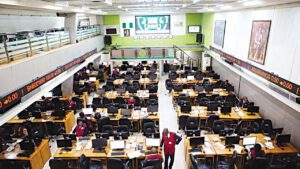
Afrinvest advises monetary, fiscal authorities to rethink anti-inflation rules
Afrinvest West Africa Limited, a capital market holding company, has advised monetary and fiscal authorities to rethink their anti-inflation strategies to holistically address the ugly narrative of surging inflation rate.
Managing Director, Afrinvest West Africa Limited, Ike Chioke, disclosed this yesterday at the unveiling of the 2023 Nigerian Banking Sector Report titled: “Getting Nigeria to Work Again!”
He explained that both the monetary and fiscal authorities have mainly been fixated on the control of money supply and selective tax reliefs.
“In our view, an effective strategy for taming the high inflation rate would be one that addresses structural bottlenecks (notably, insecurity and infrastructural gaps), improves ease of doing business, and incentivises large-scale local production of agriculture and manufactured goods alongside effective liquidity management and proper anchoring of market yields to the Monetary Policy Rate (MPR),” he said.
“In all, we stress that failure to stem the surging inflation tide in the near term would result in a contagion financial sector crisis and by extension, derail other segments of the economy from the growth path, given banks’ pivotal role as an economic bridge between the supply and demand segments of the economy,” he said.
According to the report, Nigeria’s fiscal deterioration has continued unabated. After hitting the N70 trillion mark in 2022 due mainly to the N23.7 trillion addition from securitised Ways & Means liabilities, the total public debt profile nudged higher to N87.4 trillion in the first half of this year.
“This, in addition to underwhelming revenue performance in first half of 2023 (actual revenue, N4.1 trillion, underperforms pro-rata target by 26.5 percent, and 99 percent of it, N4 trillion was used to servicing debt) has further put Nigeria on the cusp of insolvency .
“Against this backdrop, the new administration of President Bola Tinubu has introduced some policy measures to assuage the fiscal pressure, notable amongst which are the ‘partial’ removal of subsidy payment on PMS, the increase in education tax by 50 basis points to three per cent, and the introduction of a 7.5 per cent Value Added Tax on diesel,” the report said.
Despite these measures, Afrinvest said it does not see a quick fix to the fiscal pressure in the near-term, given increasing internal and external pressure points on the economy and the time lag required for policy reforms to manifest gains



